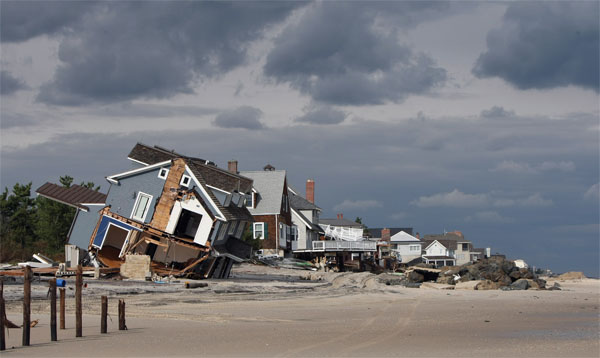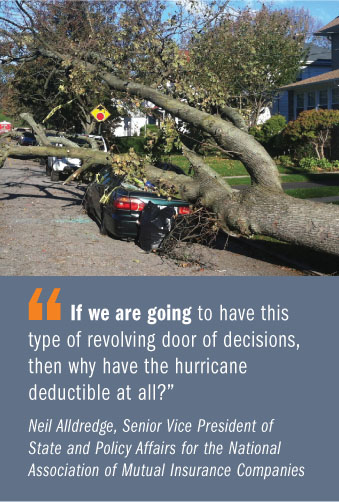 Insurance companies and trade groups continueto appeal to state regulators over the decision made by ninejurisdictions to prevent insurers from imposing hurricanedeductibles for losses suffered from Superstorm Sandy.
Insurance companies and trade groups continueto appeal to state regulators over the decision made by ninejurisdictions to prevent insurers from imposing hurricanedeductibles for losses suffered from Superstorm Sandy.
New York, Rhode Island, New Jersey, Delaware, Massachusetts,Connecticut, Pennsylvania, Maryland and the District of Columbiadeclared the hurricane deductibles invalid after the NationalWeather Service (NWS) reclassified Sandy as an “extra-tropicalcyclone” before the storm made landfall in the Garden State on Oct.29.
|But representatives of the trade groups and carriers are tellingstate regulators that they based their rates on the contractlanguage they negotiated with those states and that they areconcerned about Sandy's potential to threaten their solvency.
|“Insurers are committed and ready to help our policyholdersrecover from this terrible disaster,” says Willem Rijksen, vicepresident of public affairs for the American Insurance Association.But, he adds, “let's remember that it's absolutely essential thatwe support certainty and a robust, competitive private-insurancemarket for coastal residents in the years to come.
|“Political manipulation of private markets weakens thosemarkets—and that's the last thing coastal residents need,” Rijksenadds. “We want to work with regulators to help our policyholdersrecover.”
|Donald Griffin, vice president of personal lines for theProperty and Casualty Insurers Association of America, saysinsurance companies and their trade groups have been working withregulators to establish the rules when settling claims onSandy.
|“Whether windstorm, hurricane or standard, we want to make surethe deductibles are applied fairly and according to the terms ofthe contract,” Griffin says. He adds that insurance-policycontracts may differ by state and whether the contract calls for adeductible based on a windstorm or hurricane trigger.
|Neil Alldredge, senior vice president of state and policyaffairs for the National Association of Mutual Insurance Companies(NAMIC), says the ultimate impact from the decision will likely behigher insurance rates for everyone—and another rethinking bycarriers as to how much coastal risk they can afford tounderwrite.
| “These deductibles are importantrisk-management tools,” he says. “An insurer makes decisions on thecoastal property it will underwrite based on these practices.
“These deductibles are importantrisk-management tools,” he says. “An insurer makes decisions on thecoastal property it will underwrite based on these practices.
“We acknowledge that it will change the out-of-pocket costs fora person with a loss,” Alldredge adds, but “insurance companiesneed to rely on the certainty of the policy language. To determine,after the fact, that the language is not enforceable alters theeconomic decision-making that a company can make.”
|Post-Sandy, the risk profile for certain areas now changessubstantively—and that impacts the costs an insurer anticipates itwill absorb if an event takes place.
|“That is the situation we are dealing with now,” Alldredge says.“If we are going to have this type of revolving door of decisions,then why have the hurricane deductible at all?”
|Alldredge notes that the issue first arose last year, whenHurricane Irene came ashore. “This is what spawned the controversy,in most cases, in the same states,” he says.
|The difference is that Irene was a hurricane, and the NWS didnot change the designation before it hit land. In Sandy's case, headds, “you have this phantom decision just before landfall that allof a sudden this was not a hurricane, even though it walked like aduck and quacked like a duck.”
|The only state to classify Sandy as a hurricane was NorthCarolina, because the NWS was still considering it a hurricane whenthe state sustained damage.
Want to continue reading?
Become a Free PropertyCasualty360 Digital Reader
Your access to unlimited PropertyCasualty360 content isn’t changing.
Once you are an ALM digital member, you’ll receive:
- All PropertyCasualty360.com news coverage, best practices, and in-depth analysis.
- Educational webcasts, resources from industry leaders, and informative newsletters.
- Other award-winning websites including BenefitsPRO.com and ThinkAdvisor.com.
Already have an account? Sign In
© 2024 ALM Global, LLC, All Rights Reserved. Request academic re-use from www.copyright.com. All other uses, submit a request to [email protected]. For more information visit Asset & Logo Licensing.








